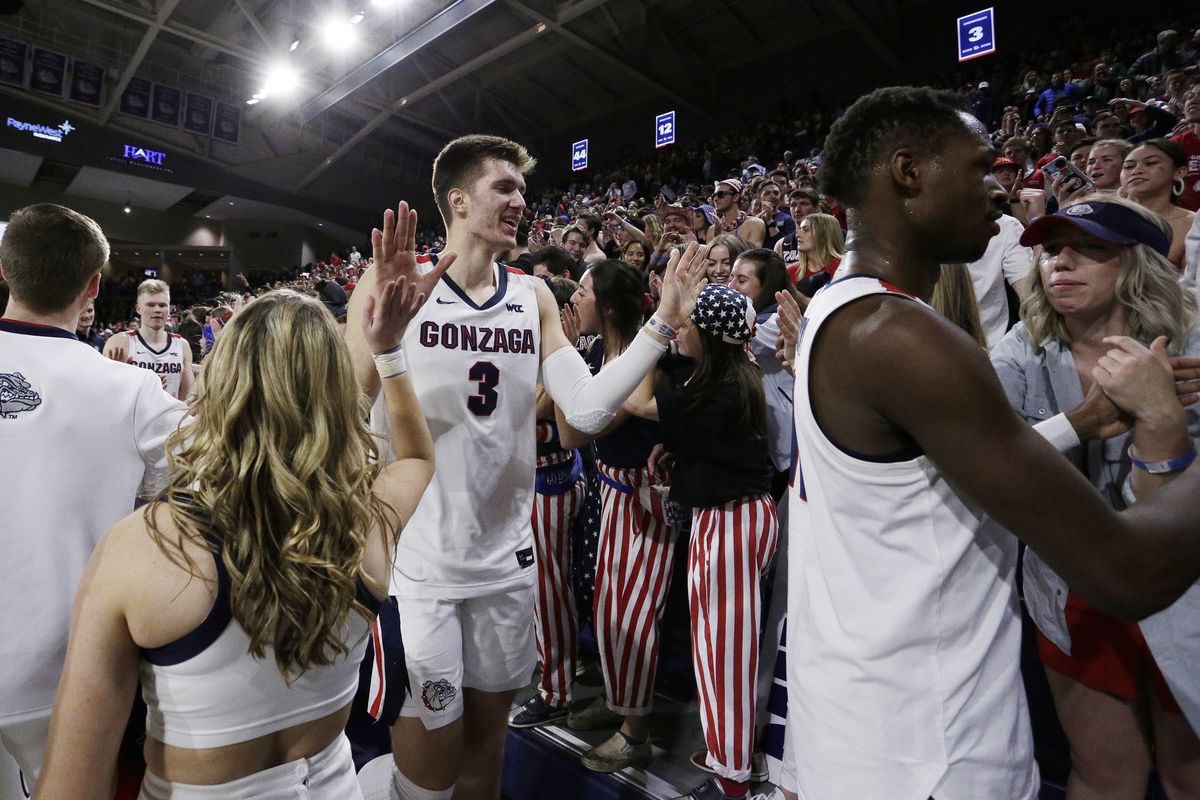Former Gonzaga forward Filip Petrusev adjusts to pro game while keeping NBA goal in mind

Filip Petrusev has played in his first professional basketball game and cashed a couple of paychecks.
The former Gonzaga standout is back in his hometown of Belgrade in Serbia, playing for Mega Bemax. He lives close to the team facility. His parents are just 10 minutes away.
The lifestyle and style of play is much different than his two years at Gonzaga, where the 6-foot-11 forward emerged last season as the team’s leading scorer and rebounder and earned numerous second- and third-team All-American designations.
Petrusev tries to follow two pages of team rules to avoid being fined. The team frequently has two-a-day practices that last up to six hours.
“That’s your job, basically,” Petrusev said in a phone interview. “That’s what you do every single day, and you have to behave like that. It takes up most of your daily time.”
Petrusev said he’s happy with his decision to turn professional and believes he’s in the best position to realize his NBA dreams. He’s trying to forge his own path, one that differs from GU predecessors who have made it to the NBA. He kept his name in the NBA draft while joining Mega Bemax.
He cited two reasons for leaving Gonzaga to play for his hometown squad.
“Obviously, the virus played a role, but even without the virus I probably would have done the same thing,” Petrusev said. “There was no (pre) draft process or workouts and no games before the draft. My goal is to try as hard as I can for this year’s draft.”
Petrusev reiterated his belief that playing for Mega Bemax gives him an opportunity to show he can operate on the perimeter, including outside shooting, ballhandling and defending in space.
“The way I was used at Gonzaga, style-wise on the court, I feel like I needed to show more to eventually get where I want to be,” he said. “I do appreciate Gonzaga and everything they’ve done. I was probably the most productive player (last year) and because of that all of the recognition came, but the end game is to play in the NBA.”
To do so, Petrusev will probably have to prove he can expand his game. He was an inside force for the Zags but hit just 27% of his 3-point attempts. He took 30 3s in 366 minutes as a freshman and only 11 last year while logging 856 minutes. His free-throw percentage slipped from 85% to 65%.
“Since the day I got here, we started working on that (perimeter game) right away,” said Petrusev, whose pro debut of 17 points, seven rebounds and 0-of-1 shooting on 3-pointers nearly mirrored his season averages last year. “Once the games started, I was in position to do all that. It’s on me to go out and do it.”
Leaving Gonzaga “was not easy at all,” he said.
“I got so used to Gonzaga, and I loved the college lifestyle, the city and support we get. It was hard, but it was best for me.”
Petrusev was in negotiations for about a month before signing with Mega Bemax in July. He said a news release was supposed to go out on a Tuesday, but it was reported a day earlier on social media.
“I was supposed to have Sunday night and all of Monday to talk to (GU’s) staff,” he said. “I just hopped on the phone as soon as I was able to (after the news leaked) to let the coaches know. They found out about an hour before I could call.”
The NBA is allowing prospects to participate in a virtual combine through mid-November. NBA teams can interview players using video conferences. Players can also visit their nearest NBA franchise and record a pro-day video, including a series of strength and agility tests, medical exams and shooting drills.
Petrusev said he received a combine invitation but won’t be involved with virtual workouts. NBA evaluators can watch video of Petrusev in a handful of Mega Bemax scrimmages and games.
“I might be one of very few guys playing (games) before the draft, and you can get in front of people,” he said.
Petrusev, 20, likes his fit on a team that features just two players older than 21. He joked that his teammates’ ages are roughly the same as Gonzaga’s with the exception of mentor Milenko Tepic, 33, and U.S. import Scoochie Smith, 25. Mega Bemax could play 50-plus games.
The style of play “is very different,” Petrusev said. “Overall, it’s way harder obviously than the WCC and harder than college as well. The five or six best teams in our league are like EuroLeague-type teams, that’s the highest level (internationally). They’re really good teams and really expensive.
“The level of physicality, there’s a lot of contact, older, mature players, maybe not as much transition. Here it’s pick-and-roll oriented, lot of reads and little stuff that in college you can get away with some things.”
The paychecks help.
“This team really develops guys so we can get bigger paychecks later, but it feels great,” Petrusev said. “You feel like your own man, more independent, and you’re ready to make some decisions on your own and live your life.”